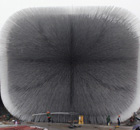-
-
China Daily E-paper
Chen Weihua
Don't miss the forest for the trees
By Chen Weihua (China Daily)
Updated: 2010-03-09 08:04
 |
Large Medium Small |
I happened to be in Honolulu in 1993 when Hawaii tried to become the first state in the United States to legalize same-sex marriage. Even the Crossroad Church came out to pledge its support.
Out of curiosity, I set up an appointment with the president of the Hawaii Gay & Lesbian Association. The man, in his 60s, was already a gay rights activist during the days of the Stonewall riots in 1969. He was quite straightforward in his answers, but I was sure that I could not get anything published in China simply because homosexuality was then not only taboo but also illegal.
Fast forward to the present: I was shooting a video clip at Times Square in New York 10 days ago when two male passers-by kissed each other.
Just last Wednesday, Washington DC began issuing marriage licenses to gay and lesbian couples, with many gay and lesbian couples waiting outside the courthouse in the early morning.
Six US states and one district so far have granted same-sex marriages. Most of the states are in the East Coast with only Iowa coming from the American heartland.
If you believe the US as an open and progressive society based on these facts, you are looking at just one side of the coin.
Most US states have in fact passed laws banning same-sex marriages. The federal government also prohibits same-sex marriage with the Defense of Marriage Act, which defines marriage as a union between a man and a woman.
For Chinese who regard the US as a progressive country, think of this: Abortion is still one of the most contested issues in US society and politics today. Most counties there don't have an abortion provider. And the US has witnessed more anti-abortion violence than any other country, with doctors being shot and murdered, their clinics set on fire or bombed.
In recent days, abortion has become an obstacle for US President Barack Obama to pass his healthcare reform bill.
So is the US a progressive or conservative society? It is both. The country is so diverse that many things about the country, however unbelievable, are all true.
While many Chinese only see one side of the US, most Americans also get a glimpse of one face of China.
Many still regard China as a nation under Mao Zedong from decades ago, when everyone wore dull blue jackets and waved the little red book. In reality, fashion in China, and in Shanghai in particular, is often colorful today. Even the once "decadent" homosexuality is increasingly tolerated and accepted in Chinese society.
Shanghai's brand new subway system also beats that of New York City, although the latter's subway is about a century old.
However, it would be misleading and problematic if you think the rest of China is like Shanghai, or Beijing, or Guangzhou. China would look like three or four worlds with different levels of economies or different mindsets in different regions.
Be it the second or third largest economy in the world; a rising number of the affluent and a shift to clean energy; 150 million people living under a dollar a day; an army of hundreds of millions of hapless migrant workers roaming the cities and some serious environmental problems, everything good and bad, progressive and conservative about China is also all true.
China has many faces. So does the US.
The two nations are often at odds with each other because people and politicians often see one side of the issue.
If they can see the whole manifold picture, the two countries would have fewer problems with each other. Even if problems linger, they would find it easier to solve them.
E-mail: chenweihua@chinadaily.com.cn









